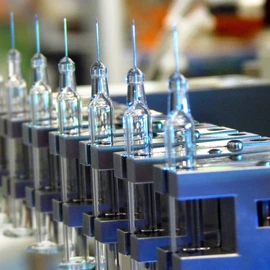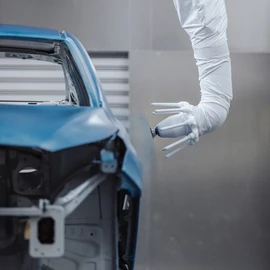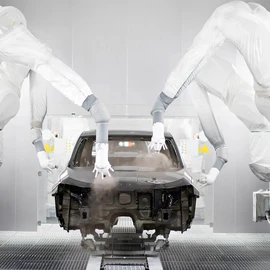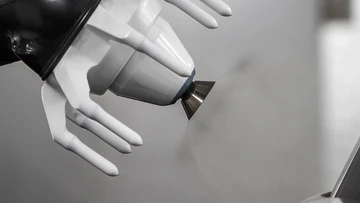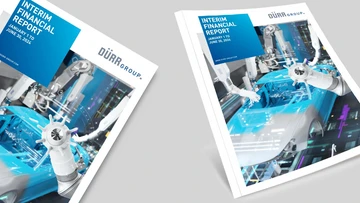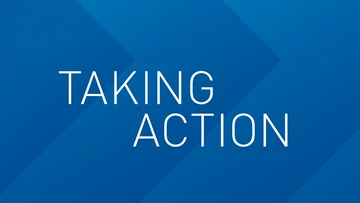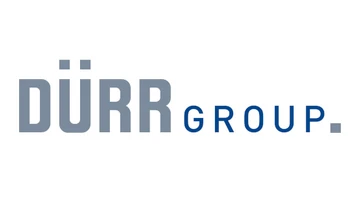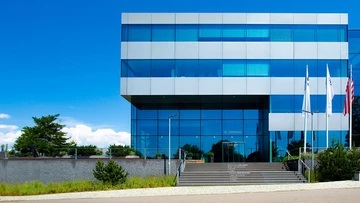Bietigheim-Bissingen, November 7, 2024 — In the current year, the Dürr Group is heading for order intake of around €5 billion and thus the upper end of its target range. The mechanical and plant engineering firm is also on track to meet its full-year sales and margin guidance. Driven by heavy investments by the automotive industry in sustainable painting technologies, order intake also reached a high figure of €1.2 billion in the third quarter. Total orders worth €4.0 billion were received in the first nine months, marking an increase of 14.0% year-on-year. Sales climbed by 4.3% to €3.4 billion, despite the expected declines sustained by the HOMAG subgroup due to the muted state of the furniture and construction sectors. Automation specialist BBS Automation, which had been acquired at the end of August 2023, also contributed to the increase in Group order intake and sales. After the first nine months, the EBIT margin before extraordinary effects stood at 5.2% and, thus, in the middle of the full-year target corridor (4.5% to 6.0%). Free cash flow rose sharply, reaching a strong figure of €82 million. Says Dr. Jochen Weyrauch, CEO of Dürr AG: “As things currently stand, we will definitely achieve all our full-year targets despite the challenging environment. We are benefiting from our strategic focus on sustainable technologies that enable our customers to engage in climate-friendly production. In particular, the sustained transformation of industrial processes is unleashing heightened modernization spending.”
Europe was the focus of the high investments in energy-efficient automotive painting systems. “Painting often accounts for just under 50% of the energy required in automotive production. With new technologies, we are enabling significant reductions and a smaller ecological footprint to be achieved,” explained Dürr CEO Weyrauch. In the Application Technology division (painting robots), order intake expanded by one quarter from January to September. At the beginning of 2025, Dürr will be consolidating the previously separate Paint and Final Assembly Systems and Application Technology divisions within a single new Automotive division. The world market leader is confident that this will result in even better customer service, integrated product development and greater efficiency in the construction of turnkey paint shops.
At HOMAG, order intake rose by 6.5% after falling by just under one third in the first nine months of 2023. However, there are no signs yet of any real recovery in business with furniture and timber house manufacturers. Order intake for environmental and battery production technology (Clean Technology Systems) was just barely able to repeat the previous year’s figure. Automation technology (Industrial Automation Systems) rose sharply due to the inclusion of BBS Automation, which had been acquired last year.
The 4.3% increase in sales was driven by gains in four of the five divisions as well as the inclusion of BBS Automation. This more than offset the decline at HOMAG (down 13.7%) resulting from muted demand in the previous year. Service business accounted for 28.1% of sales and generated above-average contributions to gross profit.
The EBIT margin before extraordinary effects widened from quarter to quarter, reaching 5.2% after the first nine months. With the exception of HOMAG, where earnings declined by just under two thirds as a result of the lower sales, all divisions posted earnings growth of at least 25%, with Clean Technology Systems boasting very strong growth of 43.1%. EBIT before extraordinary effects in the Industrial Automation Systems division (up 88.0%) benefited from the acquisition of BBS Automation. Group earnings after tax fell to €79.6 million (9M 2023: €105.3 million) due to the lower earnings contributed by HOMAG as well as higher extraordinary and interest expenses as a result of the purchase of BBS Automation. Contrasting with this, a book profit of €18.9 million accrued from the disposal of filling technology specialist Agramkow in the third quarter. The sale of the Danish company forms part of the Dürr Group’s strategic focus on its core business.
Capital expenditure rose by 4.6% to €122.3 million in the first nine months and mainly flowed into site projects at HOMAG in Germany and Poland. Despite the increased capital expenditure, free cash flow improved to €81.6 million, mainly due to the lower net working capital. Says CFO Dietmar Heinrich: “Compared to the previous year, we were able to reduce net working capital by around €100 million or 17%. This was primarily because of high project prepayments and successful destocking.” Net debt dropped by €121.2 million to €462.1 million. One of the factors contributing to this was the first purchase price payment for Agramkow (€38.9 million).
The Dürr Group had 19,895 employees as of September 30, 2024, translating into a decrease of 769 compared to the same date in the previous year (down 3.7%). This reduction mainly reflects the cutting of roughly 600 positions in response to the muted market conditions afflicting HOMAG. HOMAG cut 350 jobs in Germany under voluntary agreements without any compulsory redundancies. Another reason for the lower number of employees in the Group was the disposal of Agramkow, which has around 180 employees.
Outlook
On the strength of the large volume of new orders received in the first three quarters, order intake should reach the upper end of the target range of €4,600 to €5,000 million in 2024. Sales are expected to rise to €4,700 to €5,000 million, thus coming within the lower half of this target range. The full-year inclusion of BBS Automation will have a positive effect on both order intake and sales.
The EBIT margin before extraordinary effects should easily reach the target corridor of 4.5% to 6.0%. At 5.2% after the first nine months, robust margin performance can be expected also in the fourth quarter. The EBIT margin before extraordinary effects will presumably shrink compared with 2023 (6.1%) because of the muted conditions in the woodworking technology market, as a result of which sales at HOMAG look set to decline by up to 15%, accompanied by an EBIT margin before extraordinary effects of 2.0% to 4.0%. Earnings after tax should reach €90 to €150 million in 2024. Despite higher capital expenditure and spending on capacity adjustments at HOMAG, free cash flow should be in the upper end of the target range of €0 to €50 million. Depending on order intake in the fourth quarter and the resultant prepayments, a figure of over €50 million could also emerge.



